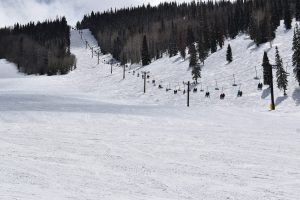Colorado State Patrol’s chain law enforcement operations are in full swing — even if winter isn’t
During an enforcement operation this week along Interstate 70, law enforcement officers issued 31 citations to commercial vehicles for failing to carry chains
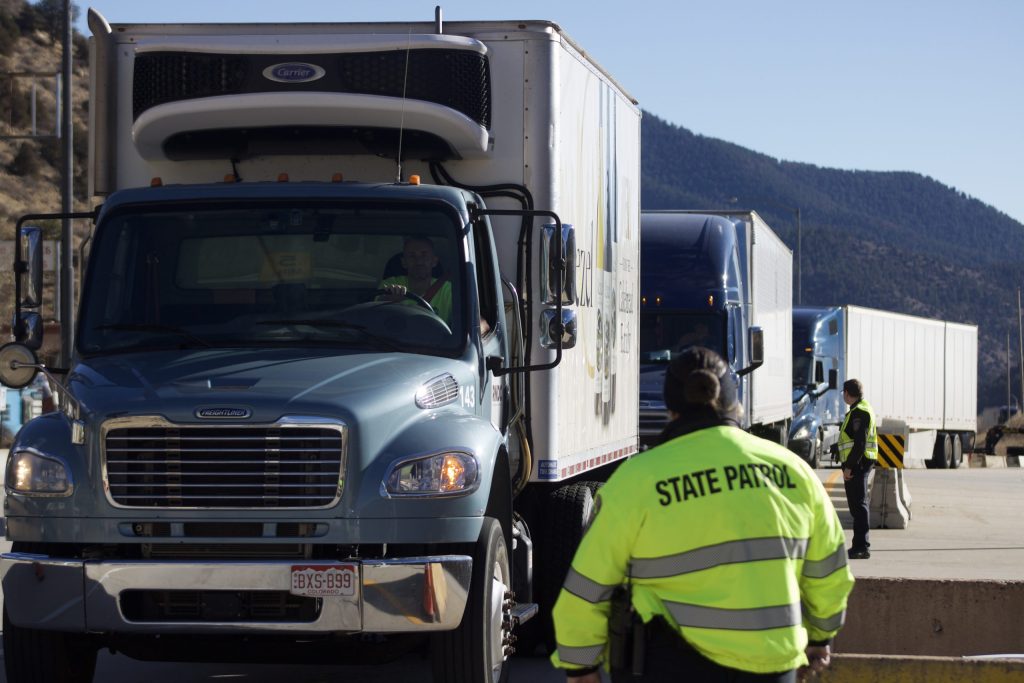
Ryan Spencer/The Post Independent
Diesel engines rumbled and the smell of exhaust hung in the air on Wednesday as semitrailers, dump trucks and other large commercial vehicles pulled off Interstate 70, lining up at the Dumont Port of Entry.
Despite sunny blue skies and unusually warm weather for November, state troopers and port of entry officers inspected every truck, asking each driver a simple question: Are you carrying chains?
“It’s Colorado. You never know what the weather’s going to be,” said Amy Hosier, Colorado State Patrol’s district supervisor at the Dumont Port of Entry. “They have to be prepared for anything. It’s been in the statute for years now that no matter what the weather is, starting Sept. 1, they’re required to carry chains.”
Colorado’s mountain roadways are not only steep and winding, but can experience extreme winter weather nine months of the year. For commercial motor vehicles, which make up about 10% of traffic on I-70, these roads can be challenging any time of year, but winter can be especially dangerous.
Because of the unpredictable weather, Colorado has a commercial vehicle chain law requiring all vehicles over 16,000 pounds to carry chains at all times when driving in the mountains between Sept. 1 and May 31.
In 2024, Colorado expanded the number of roadways where the commercial vehicle chain law applies to include I-70 west of Mile Post 259 at Morrison, Colorado Highway 9 between Frisco and Fairplay, U.S. Route 285 from Morrison to the New Mexico border, U.S. Route 50 from Salida to the Utah border and Route 40 from Empire to the Utah border, among others.
Colorado also has a passenger vehicle traction law, which requires four- and all-wheel drive vehicles to have mud and snow, winter or all-weather tires and two-wheel drive vehicles to have chains or an approved alternative traction device during the winter months.

“Colorado’s chain and traction laws exist to prevent closures, crashes and long delays,” Colorado Department of Transportation communications lead Stacia Sellers said. “Most winter shutdowns on steep grades begin with just one unprepared vehicle.”
Enforcing chain law
Last spring, the Colorado State Patrol began conducting proactive chain law enforcement operations in an effort to increase compliance and ensure some of the heaviest vehicles on our roads are equipped for winter travel.
At the DuMont Port of Entry, just a few miles past where the commercial vehicle chain law kicks in heading into the mountains, Hosier said the State Patrol has conducted chain checks weekly since September.
On Wednesday, every vehicle over 26,000 pounds was required to stop at the DuMont Point of Entry. Spread out along the line of trucks, a half dozen port of entry officers checked each truck for chains.
Some of the vehicles had chains dangling underneath their trailers, already visible to the officers, who waved them along with a thumbs-up. Other times, the officers stopped the driver to talk.
“Do you have chains?” one officer shouted to the driver of a blue semitrailer, over the roar of the engine.
“Yeah, I have six in a black box in the back,” the driver replied.
“Can I see them?” the officer asked.
The driver hopped out of the semitrailer and fished through a box between the cab and the trailer to show the officer the chains.
While most of the truckers that passed through had chains, the officers wrote a $135 citation to those who did not for violating the commercial vehicle chain law. And, it’s not just the driver’s pocketbooks that their failure to comply impacts.

Hosier explained that each company also has a safety rating associated with its U.S. Department of Transportation number. The more violations a company’s drivers rack up, the worse the company’s safety rating, which can have implications for their business.
On Wednesday, the chain law enforcement operation at the Dumont Port of Entry inspected around 300 vehicles and issued citations to 31 vehicles without the required chains.
“Generally on a typical day we’re seeing about 88% compliance is what we found,” Hosier said. “We’re still finding a decent amount of (commercial vehicles not carrying chains). The majority of them are from out of state that don’t realize they have to carry chains or just didn’t stop to get chains.”
Activating chain and traction laws
When roads are icy or snow-packed, the Colorado Department of Transportation, in coordination with the Colorado State Patrol, can “activate” the commercial vehicle chain law and passenger vehicle traction law to require drivers to put chains on their vehicles.
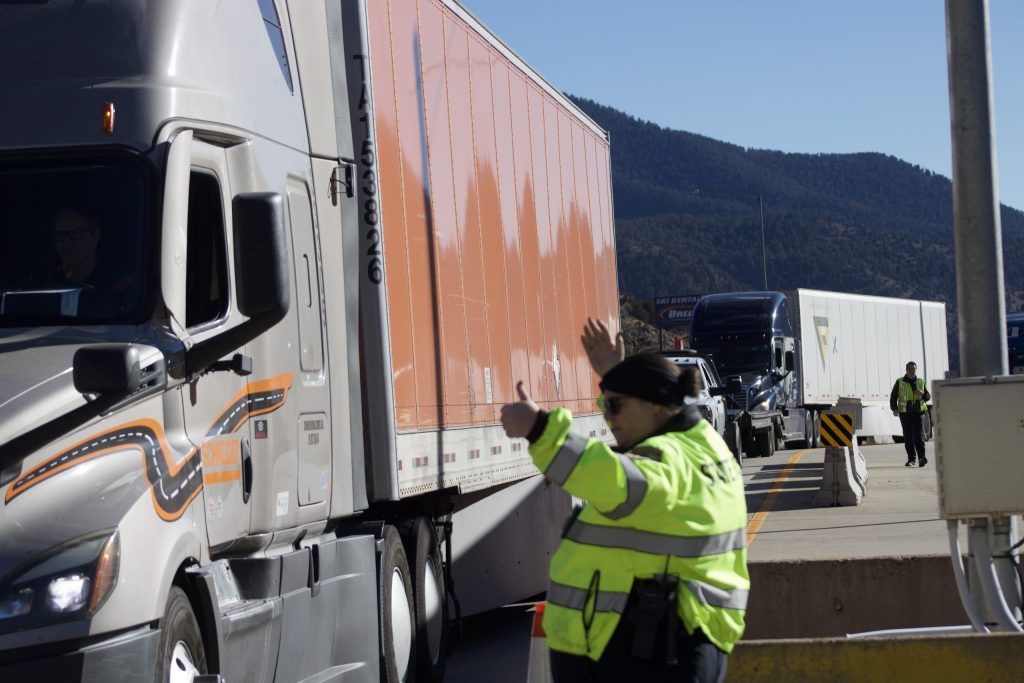
On a snowy day when chain law is activated, Hosier said that commercial vehicles are still required to stop at the port of entry, but will not only have to be carrying chains, but will also have to have them on at least four tires.
“If they don’t have them on, they’re receiving a $500 citation, which with surcharges is a little over $600,” Hosier said. “Then, they cannot continue further unless they purchase chains or the chain law gets lifted.”
If a semitrailer fails to chain up when chain law is activated and then causes a crash or blocks traffic, the driver can receive a $1,000 citation under the state’s commercial vehicle chain law.
Across Colorado, including along the I-70 mountain corridor, CDOT has variable message signs that alert drivers when chain and traction laws are activated, Sellers said. Drivers can also see when chain and traction laws are in effect on COTrip.org or on the COTrip Planner app, and commercial motor vehicles can also receive in-cab alerts.
Transportation officials decide when to activate chain and traction laws based on real-time weather and pavement conditions, assessing data from more than 150 weather stations in the state.
Last winter season, chain and traction laws were activated 530 times on the I-70 mountain corridor between Mile Points 170 and 259 from about Vail Pass to a little West of Denver, according to CDOT.
“When snow, ice, or rapidly deteriorating conditions begin to impact vehicle control or create the risk of spinouts or closures, especially on steep grades, CDOT will put these requirements in place. The laws are activated any time conditions make it unsafe for vehicles without proper equipment to continue traveling.”
Port runners
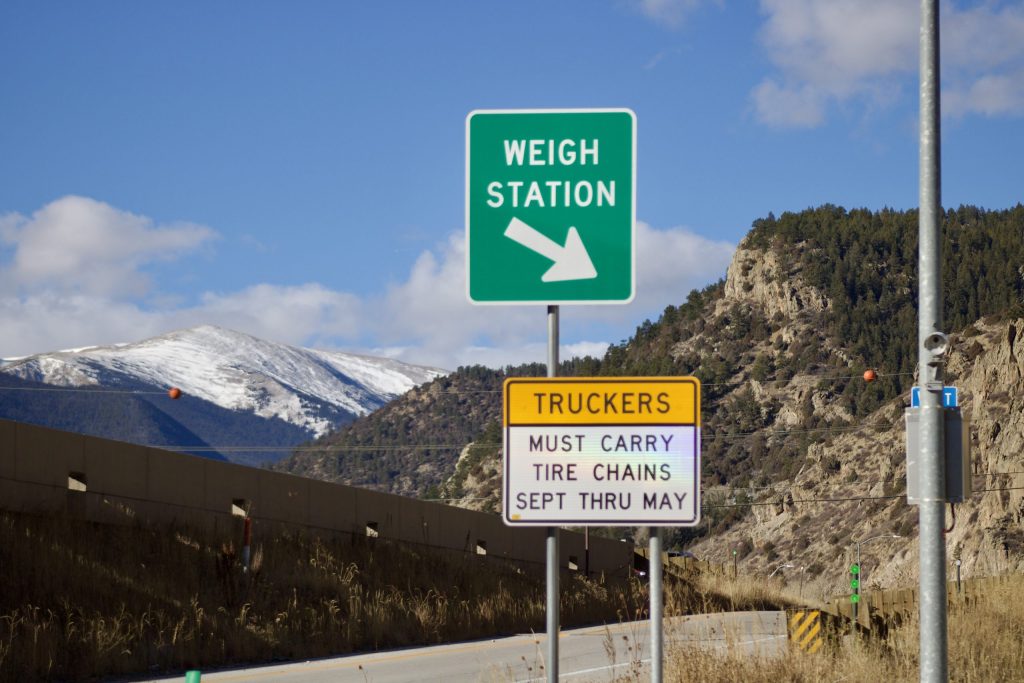
Every now and again at the Dumont Port of Entry, a commercial vehicle that is supposed to stop at the weigh station will stay on I-70 and fly by the chain law enforcement operation. That’s what the Colorado State Patrol calls a port runner.
When a driver runs a port, Hosier said Port of Entry Officers will call a nearby State Trooper to stop the driver and have them return to the port, where they’ll receive a citation and undergo an inspection.
“If they don’t stop and we have a trooper in the area, we’ll air it over the radio and they’ll actually go find them,” Hosier said. “They’ll receive a citation for not stopping at the port. It’s a little over $100, and on top of that, we’ll do an inspection.”
On Wednesday, she said troopers tracked down one port runner and arrested the driver for driving with a suspended commercial driver’s license.
The operation also resulted in three other drivers receiving court summons for driving a commercial vehicle without a commercial driver’s license. One driver had a valid warrant and was arrested.
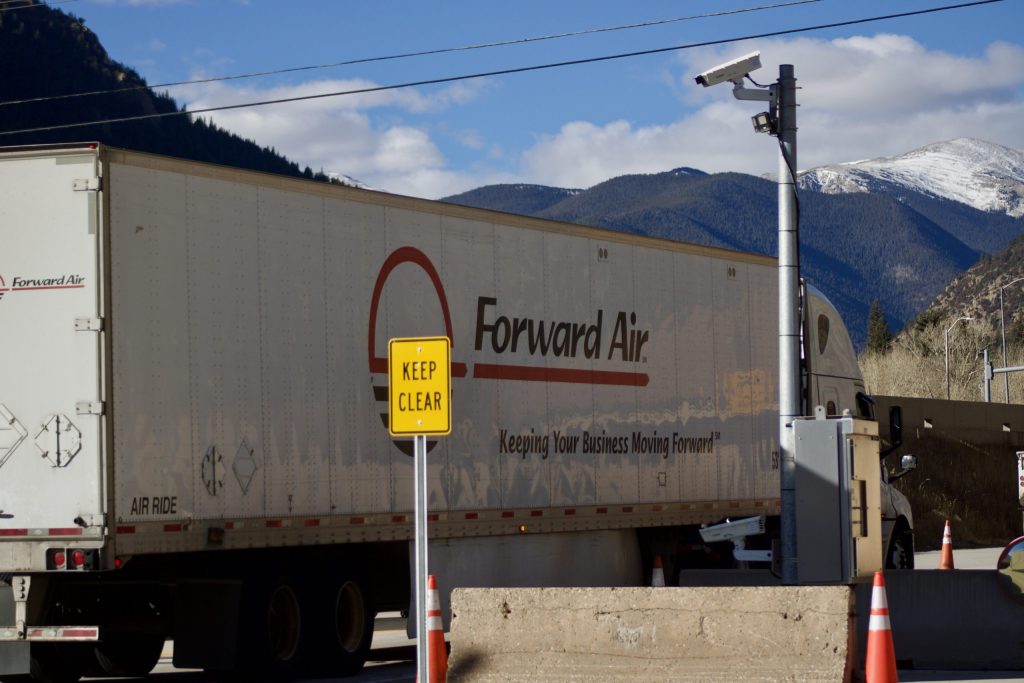

Support Local Journalism

Support Local Journalism
Readers around Glenwood Springs and Garfield County make the Post Independent’s work possible. Your financial contribution supports our efforts to deliver quality, locally relevant journalism.
Now more than ever, your support is critical to help us keep our community informed about the evolving coronavirus pandemic and the impact it is having locally. Every contribution, however large or small, will make a difference.
Each donation will be used exclusively for the development and creation of increased news coverage.

